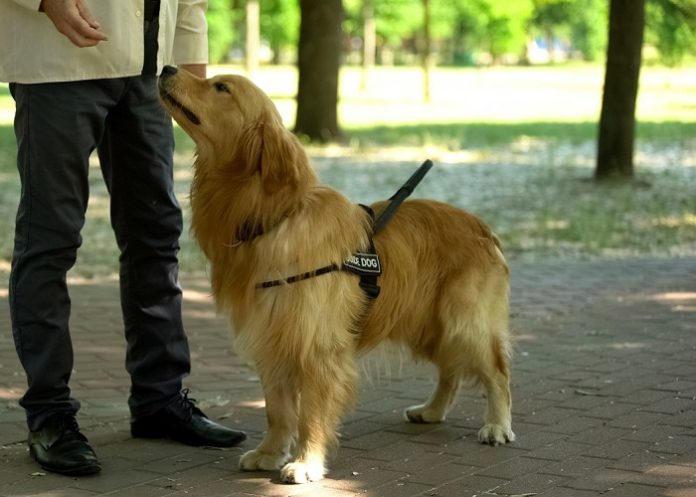People with Parkinson’s disease (PD) have an odour that can be reliably detected from skin swabs by trained dogs, a recent study has shown, during which the animals – trained to detect the disease using scent – showed remarkable accuracy in a double blind trial.
The dogs were able to identify skin swabs from people with Parkinson’s with up to 80% sensitivity and 98% specificity, even when other health conditions were present, said the researchers.
The findings offer hope for a simple, non-invasive diagnostic method using biomarkers that appear long before traditional symptoms, potentially allowing earlier treatment and slowed disease progression.
The research, in collaboration with the charity Medical Detection Dogs (MDD) and the Universities of Bristol and Manchester, was published in the Journal of Parkinson’s Disease.
Two dogs were trained by MDD to distinguish between sebum swabs from people with and without Parkinson’s disease. They were trained over a number of weeks on more than 200 odour samples from people who had tested positive for Parkinson’s and control samples from people who did not have the disease.
Samples were presented to the dogs on a stand system and they were rewarded for correctly indicating a positive sample and for correctly ignoring a negative sample.
In the double-blind testing, meaning that only a computer knew where the correct samples were, each line was also presented in reverse order so that samples for which no decision was made were re-presented. Then any unsearched samples were collected together in new lines, until a decision had been made for all samples.
A definitive diagnostic test for Parkinson’s remains elusive, so identification of potential biomarkers could help diagnosis and timely intervention.
Claire Guest, Medical Detection Dogs CEO and Chief Scientific Officer, said: “We are extremely proud to say that once again, dogs can very accurately detect disease.
“There is currently no early test for the disease and symptoms may start up to 20 years before they become visible and persistent, leading to a confirmed diagnosis.
“Timely diagnosis is key as subsequent treatment could slow down the progression and reduce the intensity of symptoms.”
Nicola Rooney, Associate Professor at Bristol Veterinary School at the University of Bristol and lead author, said: “Identifying diagnostic biomarkers of PD, particularly those that may predict development or help diagnose disease earlier, is the subject of much ongoing research. The dogs in this study achieved high sensitivity and specificity and showed there is an olfactory signature distinct to patients with the disease.
“Sensitivity levels of 70% and 80% are well above chance and I believe that dogs could help us to develop a quick non-invasive and cost-effective method to identify patients with the disease.”
The two dogs in the study were a Golden Retriever and a Black Labrador.
Study details
Trained dogs can detect the odour of Parkinson’s disease
Nicola Rooney, Drupad Trivedi, Claire Guest et al.
Published in the Journal of Parkinson’s Disease on 14 July 2025
Abstract
A definitive diagnostic test for Parkinson’s disease (PD) remains elusive, so identification of potential biomarkers can facilitate diagnosis and early intervention. Two dogs were trained to distinguish between dry skin swabs obtained from people with Parkinson’s (PwP) and control participants. After 38–53 weeks of training on 205 samples, the dogs were tested in a double-blind trial using 60 control and 40 target (drug-naïve PwP) samples. They each showed high sensitivity (70% and 80%) and specificity (90% and 98%). This supports previous findings that dogs can be trained to reliably detect the odour of PD.
Plain language summary
There is currently no single, reliable test for Parkinson’s. Understanding the biological changes that happen in the body may help early diagnosis. Dogs have an incredible sense of smell and have been trained to detect a variety of diseases. Here we have trained two dogs to tell the difference between the oily skin secretions, known as sebum, from people with Parkinson’s and those without. After their training, the dogs were tested using 60 new control and 40 target skin swabs. The dogs correctly identified 70% and 80% of the Parkinson’s samples and correctly ignored 90% and 98% of the control samples. These results support earlier research showing that dogs can be trained to reliably detect the smell of Parkinson’s disease.
Journal of Parkinson’s Disease (Open access)
See more from MedicalBrief archives:
Namibia trains Beagles to sniff out Covid
Dogs detect malignant lung cancer with 97% accuracy
Not to be sniffed at: Dogs diagnose malaria to better-than WHO standards

